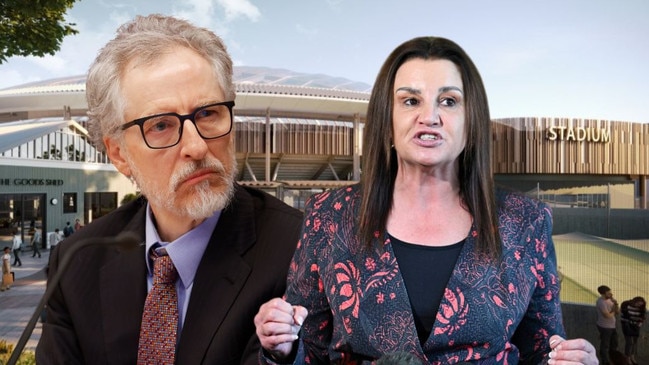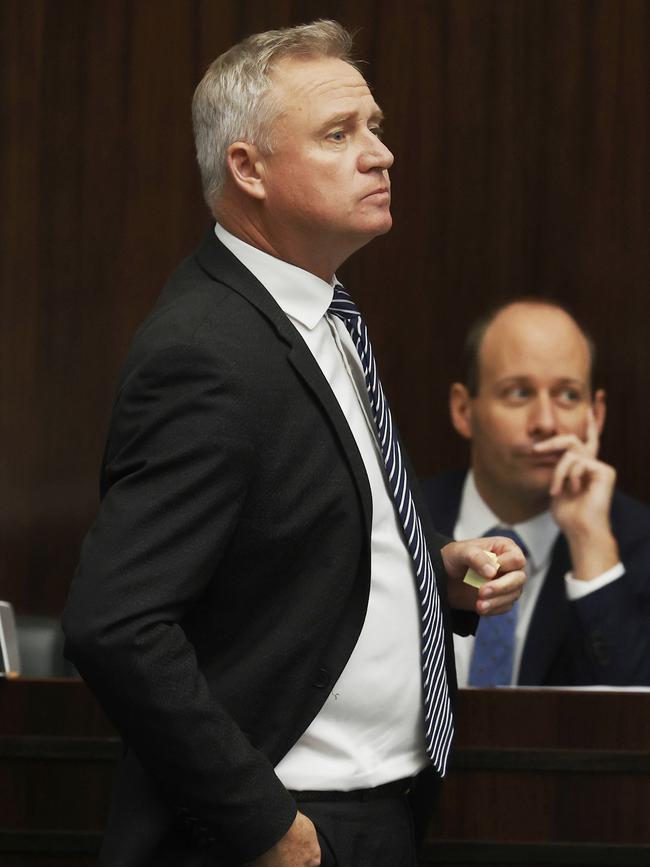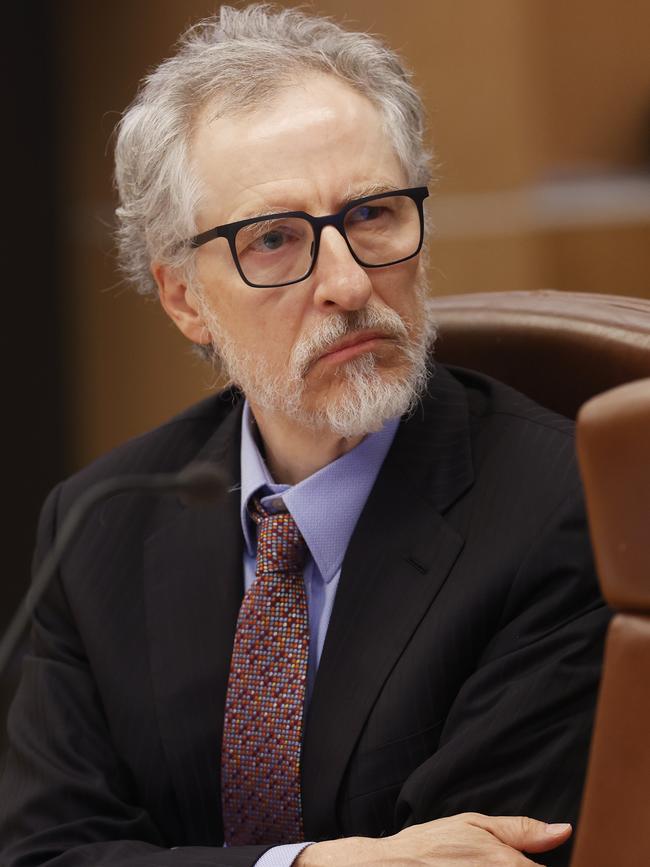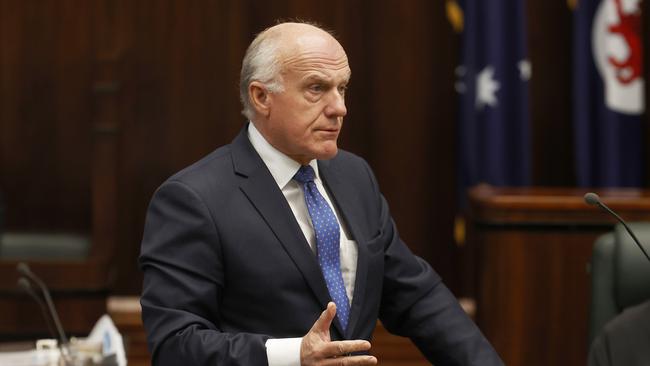Premier casts doubt over planning report after Jacqui Lambie defends Gruen’s review in face of bias claims
Premier Jeremy Rockliff says his government has no faith in the planning report on the proposed Macquarie Point stadium because of bias from Gruen’s earlier review.

Tasmania
Don't miss out on the headlines from Tasmania. Followed categories will be added to My News.
The Tasmanian Planning Commission’s report on the proposed Macquarie Point stadium is fatally flawed by bias and the government had no confidence in its findings, Premier Jeremy Rockliff said.
In state parliament on Thursday, the government continued efforts to undermine the foundations of the draft Integrated Assessment Report into the stadium, which raised serious concerns about the stadium’s financial viability, economic benefits and impact on the Hobart
waterfront and surrounds.

Mr Rockliff said the report drew heavily on the findings of a report the government commissioned from economist Nicholas Gruen, who met with stadium opponents shortly before his appointment.
Premier Rockliff said he no longer had faith in the Planning Commission’s work.
“The fact is, and as Minister Abetz said yesterday very clearly, Dr Gruen’s report is now tainted, at the very least, by an apprehension of bias,” he said.
“Now we know that TPC draft report relied heavily on Dr Gruen’s opinions.
“It goes to follow that we cannot have confidence in the Planning Commission’s report.”
“We can no longer have faith in either Dr Gruen’s report or, of course, the TPCs issues paper as well, because, because both are now tainted by an apprehension of bias, that is very clear.”
The government is expected to abandon Project of State Significance process in the coming weeks and announce enabling legislation to hasten the stadium’s approval.

Independent MP David O’Byrne called on the government to completely reject the Planning Commission’s report.
“We now know Dr Gruen failed to disclose that he met with anti-stadium campaigners prior to being appointed,” he told parliament.
“His appointment was demanded by the JLN in whose leader’s anti-stadium views are well known.
“The nondisclosure of these meetings in the nature of Dr Gruen’s nomination by the JLN means the report can no longer be considered independent and public confidence in the integrity of this entire process has been compromised.
“In the light of this, will the premier now write to the TPC and request that they set the report aside completely.”
Independent MP Craig Garland said the stadium was particularly disliked in his electorate.
“Premier will you give Braddon and all Tasmanians a say on this, and instead of bringing forward enabling legislation to bypass the PoSS process, will you bring forward legislation to enable a referendum on your multi-billion dollar stadium?” he said.
Mr Rockliff stuck to his guns.
“We are elected in this place to make decisions, and sometimes we’ve just got to make the difficult decisions for the benefit of Tasmania,” he said.
“I will be backing in our young kids, our boys and girls who want to play for their own team in their own colours and sing the team song.”
— David Killick
Lambie defends Gruen process amid heat over meeting disclosure
A senior Tasmanian government minister has openly criticised an independent economist who authored a key report on the Macquarie Point Stadium for failing to disclose meetings he conducted with prominent anti-stadium protagonists before his official appointment.
Dr Nicholas Gruen was last year commissioned to undertake an assessment of the stadium’s business case, after the Jacqui Lambie Network made an economic review of the project as a condition of its support for the minority Liberal government.

The findings of Dr Gruen’s final report, which was delivered to the government on January 1, were relied on heavily by the Tasmanian Planning Commission to produce its recently released draft Integrated Assessment Report into the proposed stadium, which the Macquarie Point Development Corporation subsequently attacked for being unreasonably broad and legally flawed.
After Premier Jeremy Rockliff was quizzed in parliament on Wednesday about Dr Gruen’s contact with high-profile anti-stadium campaigners Roland Browne and Richard Flanagan in the weeks before his commissioning, Minister Eric Abetz said the government had worked in “good faith” with the JLN to appoint an economic assessor of the party’s choosing.
Minister Abetz said when the government appointed Dr Gruen in May 2024 after the JLN nominated him as their preferred option the previous month, it was unaware the economist had already been in contact with the known anti-stadium figures.
Minister Abetz said the government was disappointed to have been kept in the dark over the meetings, and went on to cast doubt over the integrity of Dr Gruen’s final report.
“Had the government known about the meetings Dr Gruen held while the principles of the review were being developed, we would have requested an alternative candidate,” Mr Abetz said.
“The fact that this information was withheld until after the report was delivered, and never communicated to us, is of genuine concern.”

But Dr Gruen told the Mercury that consulting a wide range of stakeholders was an unremarkable industry practice, which was often undertaken by professional reviewers.
Dr Gruen said he regularly began the process canvassing people’s impressions in the very early stages of an assessment.
“Indeed, from the time I knew I was being considered as the reviewer, I often asked people I met if they had views on the subject and encountered strong opinions in both directions,” Dr Gruen said.
Premier Rockliff told parliament that the experienced economist had been the only candidate put forward by JLN during post-election confidence and supply negotiations.
“Part of our discussions with the JLN was the stadium report, if I can put it that way,” Mr Rockliff said in response to a question from independent member for Franklin, David O’Byrne.
JLN founder, Tasmanian Senator Jacqui Lambie, on Wednesday hit back at the government’s criticism of Dr Gruen’s work, saying she had encouraged the economist to familiarise himself with the stadium issue by speaking to a diverse group of stakeholders, including Roland Browne and Richard Flanagan, but also representatives from MONA and the RSL, Tasmanian Aboriginal leaders, and the proponents of Stadium 2.0.
— Duncan Abey




